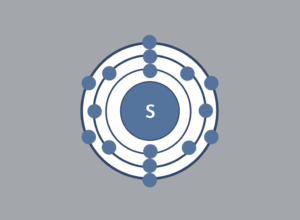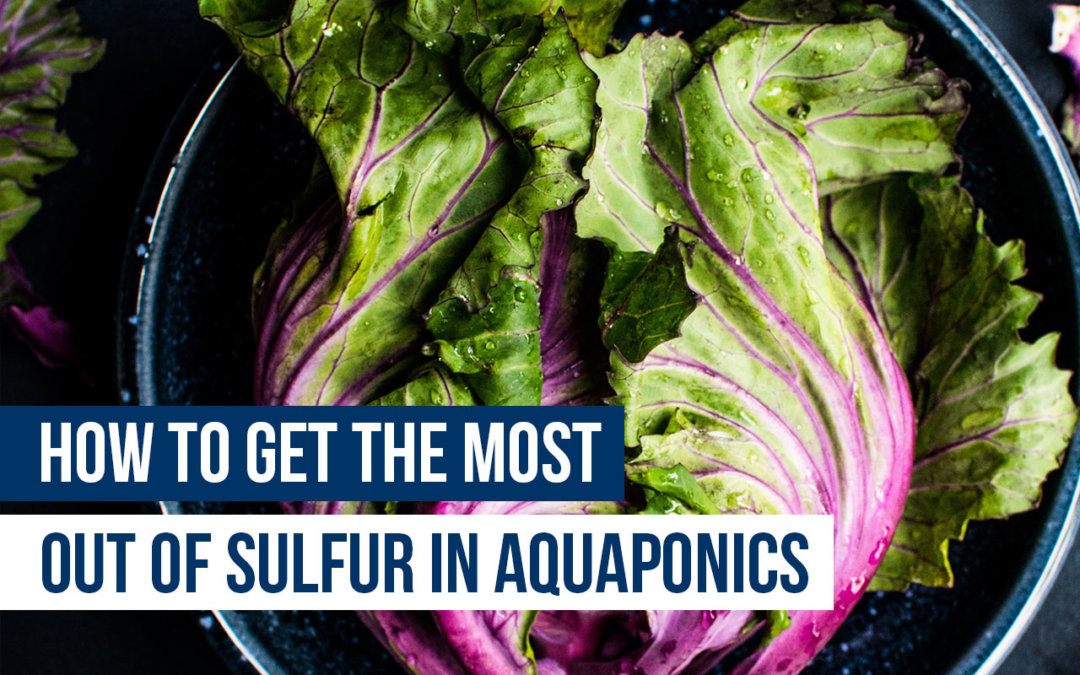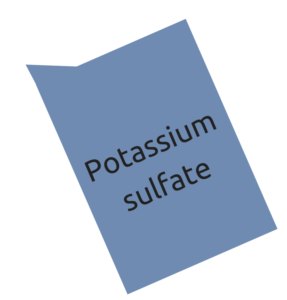Sulfur in aquaponics
In aquaponic systems, sulfur is rarely deficient. It’s one of the reasons you hear about it so often.
It’s one of the reasons you hear about it so often.
In fact, sulfur is more often present in larger-than-necessary quantities, primarily because we love to use supplements that are sulfate based.
Sulfur is another secondary macronutrient (along with calcium and magnesium). It occurs in aquaponic systems as sulfate (SO4²-), a soluble anion. Sulfate is taken up directly by the plant and is very important in the production of many amino acids, proteins, and oils.
In many crops, sulfur is as important as phosphorus to plant growth and development! Without enough sulfate, plants will be spindly, with yellowed new growth.
Sulfur deficiencies and toxicities are rare
In many crops, sulfate deficiency is often confused with other deficiencies.
However, in aquaponic systems, sulfate deficiencies are rare because sulfates tend to run pretty high.
Sulfur toxicities are also rare. Many aquaponic enthusiasts are very concerned about excessive sulfates impacting their plant production. It can happen, but it is rare.
Some people have systems that run up to 100 ppm, some even 200 ppm. I will say try to keep it below 60, ideally, but if it bumps above that it shouldn’t hurt your plants or even your fish. The worst thing that can happen is that you’ll see a little bit of a nitrogen deficiency simply because sulfates can interfere a little with nitrate uptake.
You can diagnose this by testing your nitrate levels. If they are normal but you’re seeing a slight nitrogen deficiency, it could mean that your sulfates are a little high.
The truth is that in aquaponic systems sulfates will almost never be excessive to the point of negatively impacting plant production. In the case that plants are adversely affected by high amounts of sulfate, they are great at regulating the intake, and taking up the excess and storing it.
This means that even if your sulfates run high, you needn’t worry too much about toxicity. You can worry about your cabbage being smellier than usual, but that’s about the extent of the damage that high sulfates can do in most aquaponic systems.
Sulfur can be supplemented with other nutrients
Does this mean that more growers should lean on sulfate-based supplements? The answer to this question is only when appropriate. Because sulfate is seldom deficient, you shouldn’t be concerned about supplementing it as a grower.
However, in systems where the pH runs high and causes the availability of other nutrients to suffer, sulfate-based supplements can be a great way to get system nutrition back on track. Potassium sulfate and magnesium sulfates are great examples of this.
Ideally, these two plant nutrients would be supplied as hydroxides or, in systems with very low pH values, as carbonates. In high pH systems this isn’t possible, so in these instances, the use of either potassium sulfate (0-0-50) or magnesium sulfate (Epsom salt) can be a very fast and effective way to supplement these nutrients in solution.
Historically, we’ve used many sulfates as system supplements, and many additional folks have experienced the benefits they can offer. Because they’re a new concept to many growers, there’s a great deal of hesitancy about starting to use them. I hope that this post helps illustrate that while they shouldn’t be used willy-nilly, sulfate-based supplements can be a powerful tool in the hands of an aquaponic grower.
Read about the other important nutrients in aquaponics:




Hi Nate, I’m reading Dr. Wilson Lennard’s book, “Commercial Aquaponic Systems,” and I was wondering how do I reconcile your post’s claim that sulfur deficiencies are rare and his comment that lack o sulfur is often a problem (not unless a UVI feeding ratio is applied) because fish feed is low in magnesium and sulfur. Thanks!
Hi Nate. can I ask a question about sulfur??
I’m running dwc aquaponics farm in Korea. it’s 200t system.
And my system has a high sulfur. It’s almost 200ppm.
There’s no nitrate deficiency yet, but I want to know how remove sulfur in my dwc system…
Can you please tell me how can I reduce sulfur in my system??